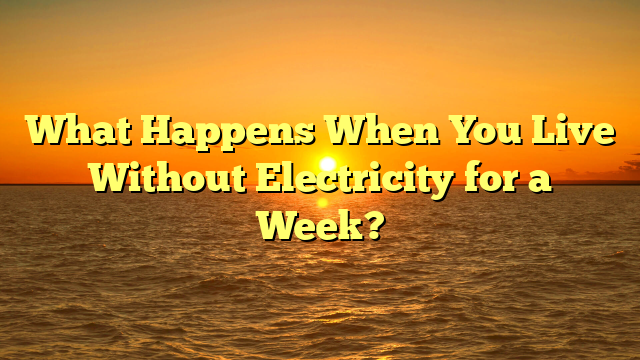## Lights Out: A Week Without Electricity – What I Learned
We live in a hyper-connected, electricity-dependent world. Imagine, for a moment, a world without the hum of the refrigerator, the glow of your phone screen, or the comforting warmth of a centrally heated home. Intrigued? Terrified? I was a mixture of both. Recently, I embarked on a self-imposed week-long experiment: living entirely without electricity. It wasn’t a glamorous “off-grid” retreat in a secluded cabin; it was a challenge undertaken in my own, surprisingly electricity-reliant, home. And let me tell you, it was a fascinating, humbling, and occasionally frustrating experience.
### Day 1: The Initial Shock (and the Darkness)
The first day was a steep learning curve. Switching off the main breaker felt almost sacrilegious. The immediate silence, punctuated only by the creak of the house settling, was unnerving. The initial darkness was disorienting; I fumbled for my flashlight, a crucial piece of equipment I’d thankfully remembered to charge beforehand. Simple tasks became unexpectedly difficult. Cooking dinner on my trusty camping stove required planning and patience, a stark contrast to the instant gratification of my microwave. My phone, my constant companion, became a rapidly depleting power bank, used sparingly for essential tasks.
### Day 2-3: Adapting to a Slower Pace
The initial panic subsided, replaced by a strange sense of calm. Without the constant buzz of notifications and the tempting allure of screens, I found myself engaging in activities I’d long neglected. Reading became a pleasure again, not a snatched moment between emails. I rediscovered the joy of conversation, spending longer evenings chatting with my family. The absence of artificial light forced me to embrace the natural rhythms of the day, going to bed earlier and waking with the sunrise. This slower pace of life was surprisingly restorative.
### Food, Glorious Food (Without Appliances)
Food preparation became a significant undertaking. My usual quick meals were out of the question. I relied heavily on pre-planning and simple recipes that could be cooked on the camping stove. The initial novelty of cooking over a flame soon wore off, replaced by the realization of how much energy modern appliances save us. Food preservation became a critical issue. Keeping food cool without a refrigerator was a constant battle, necessitating careful planning and frequent trips to the cooler. I quickly learned the importance of food preservation techniques our ancestors relied on for centuries.
### Hygiene and Comfort: Back to Basics
Maintaining personal hygiene without electricity was another unexpected challenge. Warm showers were a distant memory, replaced by lukewarm water from a bucket heated on the stove. Washing clothes became a laborious task, involving hand-washing and line-drying. The lack of heated water and the physical effort involved in these tasks made me appreciate the seemingly simple comforts of modern life. Sleep, while initially disrupted by the cold, eventually became restful, perhaps enhanced by the absence of screens before bed.
### Communication and Connectivity: The Digital Detox
The inability to easily communicate with the outside world was initially unsettling. My phone’s battery became a precious resource, carefully conserved for emergency calls only. The lack of internet access felt liberating in some ways, removing the constant distraction of social media and the news cycle. It forced me to connect with people in person, reviving the almost forgotten art of face-to-face interaction.
### Day 4-7: Embracing the Unexpected and Appreciating the Familiar
As the week progressed, I became more adept at managing the challenges. I refined my cooking techniques, optimized my water usage, and developed a more efficient system for managing my limited resources. I began to appreciate the ingenuity and resourcefulness of past generations who lived without electricity. The experience wasn’t without its frustrations, but the overall impact was overwhelmingly positive.
### Conclusion: A Valuable Lesson in Simplicity
Living without electricity for a week was a profound experience that shifted my perspective. It wasn’t about romanticizing a simpler past; it was about gaining a deeper appreciation for the conveniences of modern life, and understanding their environmental cost. While I wouldn’t advocate for abandoning electricity entirely, the experience taught me valuable lessons in resourcefulness, self-sufficiency, and the importance of mindful living. It was a reminder that true comfort doesn’t always equate to technological advancement; sometimes, it lies in the simplicity of a quiet evening, a good book, and the company of loved ones. The lights are back on now, but my perspective has been irrevocably changed.

